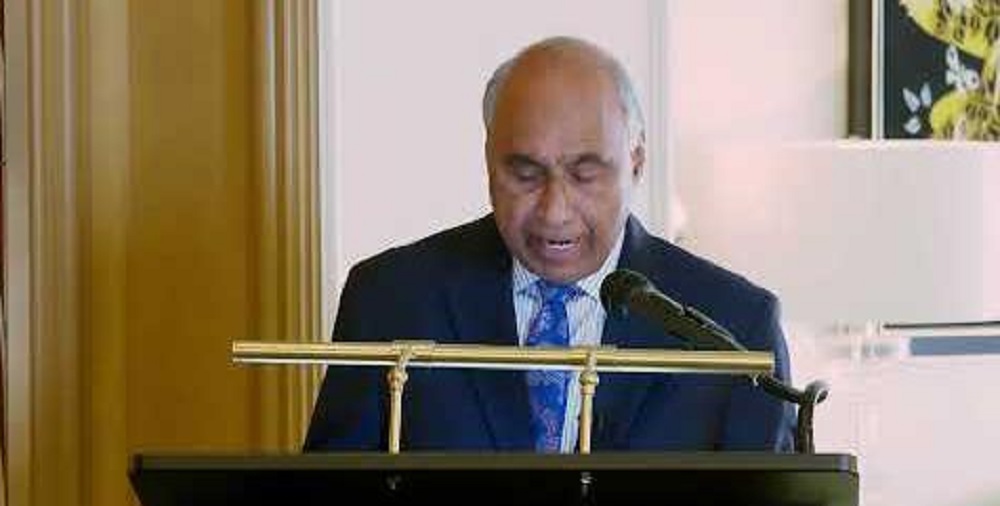By Frank F. Islam
Dr. Kazmi; Mr. Saleh Mohammad; Faculty and staff; Students; Ladies and Gentlemen:
Thank you so much for a wonderful Introduction. I am deeply grateful for your warm welcome.
it is truly an honor for me to receive this Honorary Doctor of Philosophy Degree from Maulana Azad University. I am pleased and delighted to accept this Degree with all due humility not for me, but in recognition of all those Maulana Azad University giants who have made a difference in society through their leadership, education, and public service.
Before I begin, I would like to take this opportunity to express my deep gratitude to Dr. Jameel Kazmi for inviting me to give this address. I want to commend Dr. Kazmi for his leadership and his enduring service and commitment to Maulana Azad University. We admire and appreciate all you do to make a positive and profound difference.
It is also an honor for me to be on the agenda for this convocation with distinguished individuals such as Saleh Mohammad, the minister of Rajasthan. It is an honor to be joining with the faculty, staff, family and friends of the graduates to celebrate this event.. Most importantly, it is an honor to say a few words to you graduates as I accept this honorary degree.
I used the word honor several times in my opening comments. That word has three definitions:
- An award or recognition for accomplishments
- A privilege or respect to be allowed to serve
- Honesty, fairness or integrity in one’s beliefs and actions
I will focus my comments today on that last definition and share a few thoughts on honor. In my opinion, honor is achieved in one’s life through good citizenship.
When he was inaugurated as President of the United States, John F. Kennedy, famously said, “Ask not what your country can do for you. Ask what you can do for your country.” Our own Mahatma Gandhiji famously said, “Be the change you would like to see in the world.”
I know you graduate understand the connection between honor and good citizenship because of graduating from Maulana Azad University. It’s mission states that “Gain knowledge and serve mankind is the primary motto of Maulana Azad University”. It’s vision states that the University will be “recognized for contributions to the educational and economic development of society and nation.”
I am confident that all of you graduates have been prepared to help deliver on that mission and vision in your livesas you make your respective journeys as good citizens.
That said, let me share a few thoughts on good citizenship based upon my journey. Civic engagement is at the heart of good citizenship.
Civic engagement means working to make a difference in the civic life of our communities and developing the combination of knowledge, skills, values and motivation to make that difference.
In my opinion, civic engagement takes five primary forms:
- Individual – being the best one can be and personally responsible for one’s actions
- Organizational – contributing to the success of the groups (e.g., business, religion, associations) to which one belongs
- Political – participating in those processes that shape the structure and nature of government
- Community – collaborating to make the locale and the world in which we live a better place
- Social – advocating for justice and equality of treatment and opportunity for all
When I began my education at Aligarh Muslim University, started the IT Company, QSS Group -my entrepreneurial business in the United States,and took other steps to become a philanthropist on my personal journey, I didn’t really think about them as a form of civic engagement. In looking back now, I understand that they definitely were and that we are all here on this earth for a higher purpose.
As I have made my journey, I have not always done so perfectly, but have done so with a commitment to always doing better and to helping others do the same. That has been my personal philosophy – and I am pleased to be given an honorary degree for that approach and my accomplishments on my journey.
I have learned much from my journey. Here are three lessons from mine and requests for yours.
My first lesson and request is: Don’t think anything is impossible. No hope should be too high for you to achieve and no dream should be too large for you to achieve.
If you would have asked me more than 40 years ago coming from a middle-class family in India, could I achieve and accomplish what I have, I probably would have said no. I was not certain about where I would end up when I went from India to the United States. But I knew absolutely that working hard, aiming high and getting the right education was the key to success.
My story is testimony to the fact that anything is possible if you make it your journey
My second lesson and request is: Do well but also do good. Reach out and help those who are voiceless and vulnerable. Help them through darkest moments of their lives. Please remember when they succeed, all of us succeed. India succeeds. The world succeeds. People cannot succeed when they are held back.
Each of you has been well prepared by this excellent institution to excel in your chosen profession and I am sure that you will. That is the starting point for civic engagement as it provides the opportunity to also be a difference-maker in other areas of your choice.
My third lesson and request is: Extend your hand, hope, heart, and help to those in the weaker sections especially those who are socially and economically disadvantaged and who are less fortunate, reach out and help them with education and inclusive economic mobility.
Notice that I said hand-up and not handout. Those in the weaker sections need to be empowered. Consider making that empowerment one of your areas for making a difference. That empowerment can come in any number of ways. But I think the key ingredients are what I call the 3-E’s. Those E’s are education, employment and engagement.
In closing, let me leave you with words from Maulana Azad who as you know was a leader of India’s freedom movement, the first education minister of India, and a fierce advocate for Hindu-Muslim unity.
Maulana Azad said:
- Education imparted by heart can bring revolution in the society.
He also said:
- Let us sacrifice our today so that our children can have a better tomorrow.
India has made great progress since MaulanaAzad spoke those words early in its establishment as a nation. There has been no revolution since India was given birth in 1947 but there has been a steady evolution.
Because of your substantive and socially conscious education, all of you graduates of Maulana Azad University can contribute to and accelerate that evolution and make the sacrifices that are necessary to ensure that all the children of India have a better tomorrow.
It has been my honor to share my thoughts with you today. It will be an even greater honor at a point in the future to learn that some of you are accepting honorary degrees from this wonderful institution.
Till then, I say – congratulations on your graduation and wish you all the best on your journeys.
May God bless and protect you in your honorable lives. God Bless your families. And, God bless India.






0 Comments